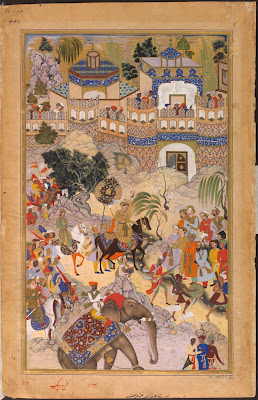Economic
Condition during Mughal Period
 |
Economic
Condition during Mughal Period
|
India was
quite prosperous during the regime of Shahjahan. Its foundation was laid by
Akbar. He not only provided security and stability to the Mughal Empire but
also made it so prosperous that his successors enjoyed heyday. As the wealth
was mostly confined with the emperors, the nobles, traders and industrialists,
so they enjoyed the pleasures of wealth. However, the common masses also were
not deprived of the comforts, as all the commodities of daily use were
available in profusion and at a very cheap rate, but with the accession of
Aurangzeb the situation began to change. The revolts and wars which took place
during his reign drained away the economic resources of the empire. Moreover,
the weak rulers and inefficient emperors also helped in shattering the economic
structure of the empire. During the reign of inefficient later Mughals the
economic structure of the empire deteriorated to such an extent that the common
masses failed to fulfill their basic demands. But as the early Mughal rulers
were benefactors of the people they established various industries which not
only provided employment to the common people but also fetched a lot of income
which made the country prosperous.
Besides the
emperor, the rich traders, mansabdars and high officials had a lot of wealth
with them. The condition of the scholars, artists and craftsmen was also
satisfactory but the labors pertaining to industry or agriculture were leading
a deplorable life. Peasants were the greatest sufferers during this period. They
were forced to pay various taxes by the Emperor and exploited by the revenue
officers. Thus, the economic structure of Indian society during the Mughal
period was feudal and people were divided into upper and lower classes. The upper
class enjoyed all the pleasures of life whereas the lower class suffered a lot.

0 टिप्पणियाँ:
एक टिप्पणी भेजें
THANKS FOR YOUR COMMENTS
टिप्पणी: केवल इस ब्लॉग का सदस्य टिप्पणी भेज सकता है.